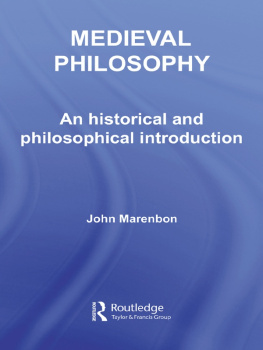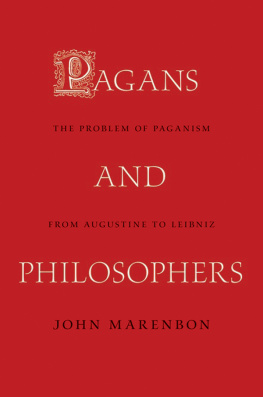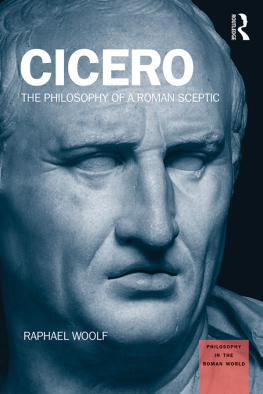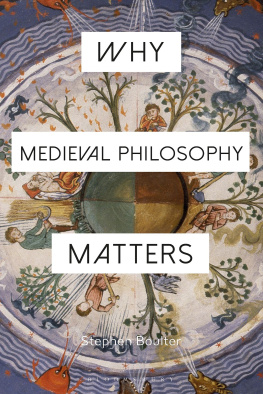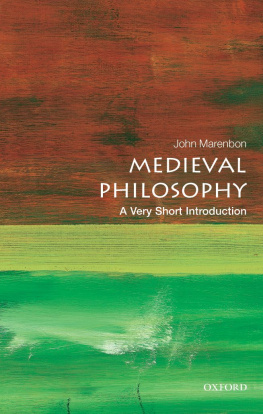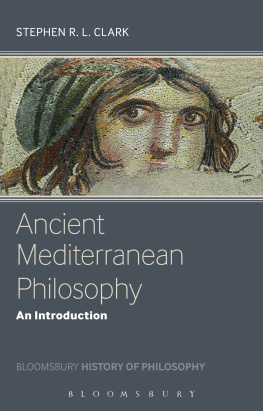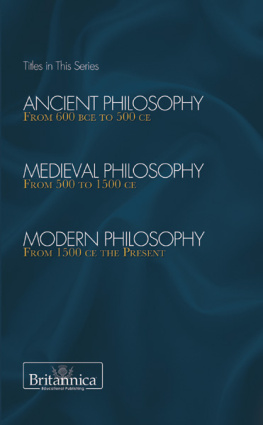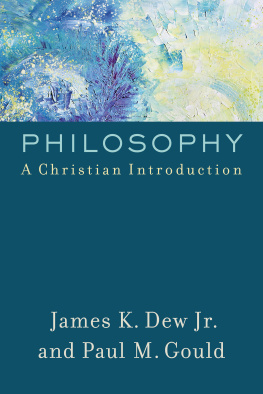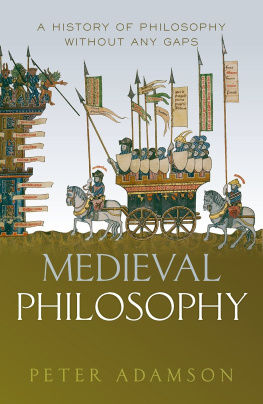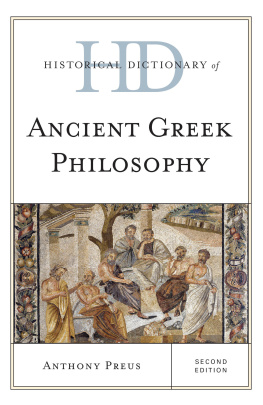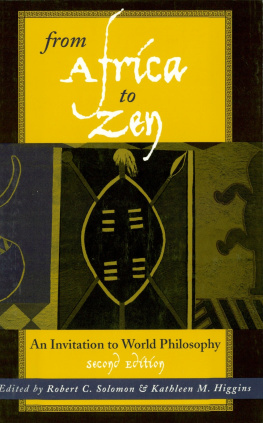All students of medieval philosophy, medieval history, theology or religion will find this necessary reading.
First published 2007
by Routledge
2 Park Square, Milton Park, Abingdon, Oxon OX14 4RN
Simultaneously published in the USA and Canada
by Routledge
270 Madison Ave, New York, NY 10016
This edition published in the Taylor & Francis e-Library, 2006.
To purchase your own copy of this or any of Taylor & Francis or Routledges collection of thousands of eBooks please go to www.eBookstore.tandf.co.uk.
Routledge is an imprint of the Taylor & Francis Group, an informa business
2007 John Marenbon
All rights reserved. No part of this book may be reprintedor reproduced or utilised in any form or by any electronic,mechanical, or other means, now known or hereafter invented,including photocopying and recording, or in any information storageor retrieval system, without permission in writing from the publishers.
British Library Cataloguing in Publication Data
A catalogue record for this book is available from the British Library
Library of Congress Cataloging in Publication Data
A catalog record for this book has been requested
ISBN 10: 0-415-28112-1 (hbk)
ISBN 10: 0-415-28113-X (pbk)
ISBN 10: 0-203-96876-X (ebk)
ISBN 13: 978-0-415-28112-6 (hbk)
ISBN 13: 978-0-415-28113-3 (pbk)
ISBN 13: 978-0-203-96876-5 (ebk)
PREFACE
This book is not, despite its title, a revision of the Introductions to Early and Later Medieval Philosophy I wrote twenty years ago. But it owes its origin to a request for one. Would I, asked my publishers, like to up-date my two books so that they could be issued as a single volume? I quickly realized that there was so much I wanted to change, or rather, so little I was willing to retain, that it would be much better to offer an entirely new Introduction. Routledge bravely accepted my proposal, and here now is the book. In its conception of what constitutes medieval philosophy, it could hardly be more different from the two earlier Introductions. They focussed exclusively on the Latin tradition, with Islamic and Jewish material introduced only in so far as it affected the Christian thinkers in the universities. This new book aims to introduce all four main traditions of medieval philosophy that go back to the same roots in late antiquity: the Greek Christian tradition, the Latin tradition, the Arabic tradition and the Jewish tradition (written in Arabic and in Hebrew). Chronologically, the scope may seem at first to be not so different from that of my old books, since the stopping date is 1400, only about seventy-five years later than the improbably early point where Later Medieval Philosophy finished. But, as I argue in my Introduction and in the final, brief chapter, 1400 is a completely arbitrary deadline, and the best approach to the material considered here might be to envisage a period running from c. 200 to c. 1700 a long Middle Ages so long that it hardly remains the Middle Ages as a unit for teaching and study. Although, then, this book covers almost all the ground that would be expected of an introduction to medieval philosophy, to me its central point lies more in what it fails, in its present state, to do. I see it as incomplete: the first of two volumes (the second to run from 1400 1700) which, taken together, are designed not so much to cover medieval philosophy as to challenge the idea of it as a coherent historiographical unit.
The most pleasant feature of finishing a book is the chance it gives to thank those who made the writing of it possible. First and foremost, this book, and indeed almost all my work on medieval philosophy, could never have been accomplished were it not for the generosity of Trinity College, Cambridge, in supporting me. I am also indebted to Sheila and Maximus for their tolerance and support in living with someone trying to write so much so quickly.
In June 2005, just before I started writing this book in earnest, Scott MacDonald gave me the chance to present my plan and my ideas about methodology to the annual Cornell Medieval Philosophy colloquium: I am grateful to him, and to all of the colleagues there who contributed to the discussion, as I am to William Courtenay and his graduate students, to whom I spoke about the same issues more recently. Many friends have kindly accepted my requests to read sections of the book and comment on them: I would like to thank Jennifer Ashworth, Clare Jarmy, Taneli Kukkonen, Martin Lenz, Tony Street and Sophia Vasalou. I am especially grateful to Henrik Lagerlund, who read the whole manuscript, and above all to Margaret Cameron, who has advised me constantly, since I began writing, both on detail and on issues of method and aim. Without her help, this book would certainly have been worse. I would also like to thank Priyanka Pathak, Development Editor in Philosophy at Routledge. Without her interventions reminding me of the deadline and the production schedule this book would certainly have been much better, but it would not be finished by now, and probably never. I am also grateful to Geraldine Martin for seeing the book through production with care, efficiency and grace.
In October, as I was right in the middle of my writing, my mother died suddenly at the age of ninety. I dedicate this book to her memory, and that of my father, who died many years earlier.
John Marenbon,
Trinity College,
March 2006
METHODS OF REFERENCE
).
A list of editions and translations of primary works will be found under the name of each author in the Bibliography (medieval names are cited given name e.g. John first; Arabic names are given in the form most usually known, with the definite article (

